Business and Corporation Law: Liability and Partnership Issues
VerifiedAdded on 2021/05/31
|6
|1091
|84
Report
AI Summary
This report analyzes two legal cases related to business and corporation law. The first case examines the liability of an individual, Steve, who entered into contracts on behalf of a company before its registration. It discusses the implications of Section 131 of the Corporations Act 2001 regarding pre-registration contracts and the liability of individuals if the company does not ratify the contract. The second case focuses on a partnership and the liability of a partner, Simon, who made transactions exceeding his authority. It references the Partnership Act 1963, outlining the limits of a partner's authority and the circumstances under which the firm is bound by a partner's actions. The report concludes that Steve is liable for breach of contract in the first case and that the partnership is not liable for Simon's unauthorized transactions in the second case. The report references relevant legislation and a legal textbook to support its analysis.
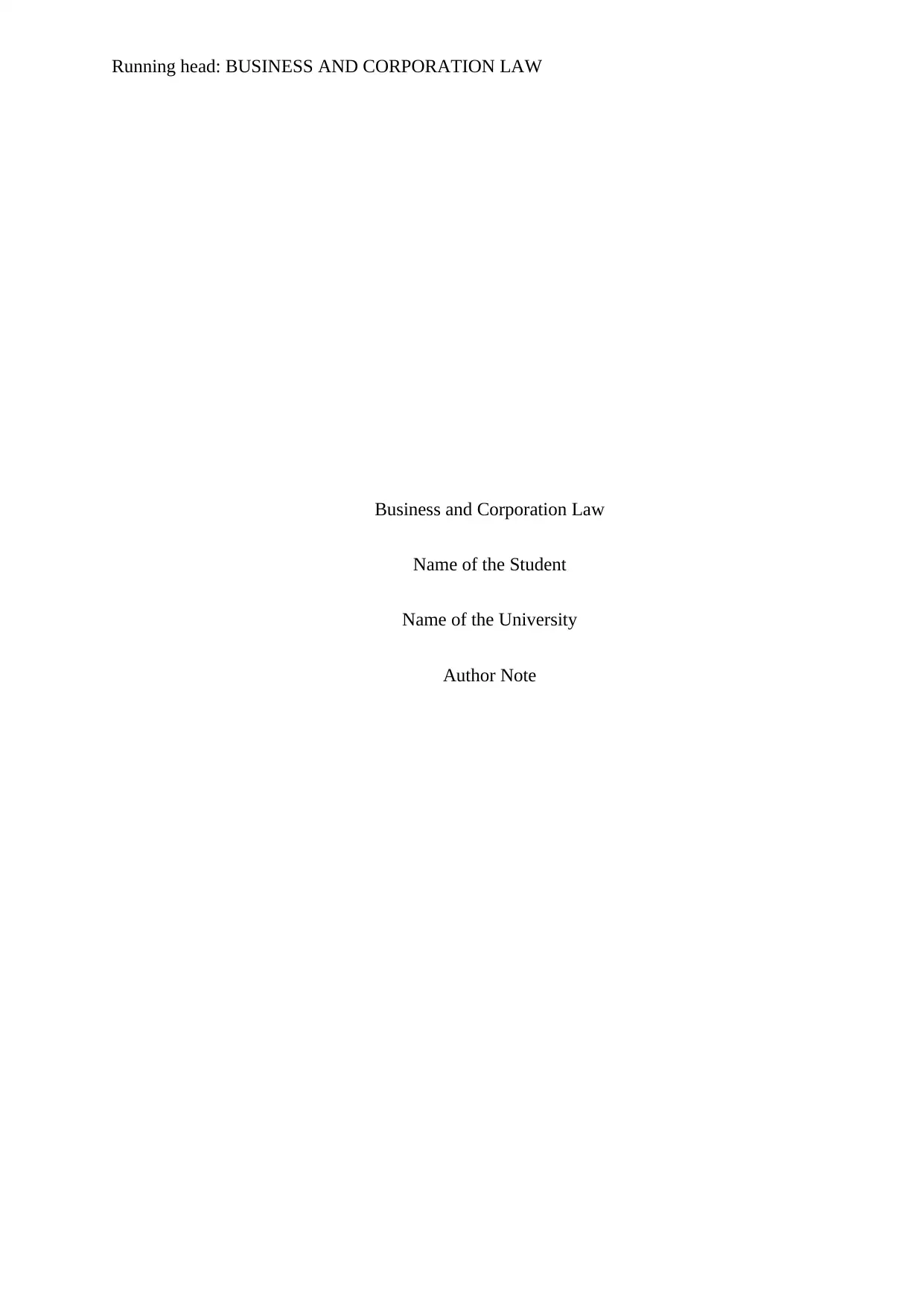
Running head: BUSINESS AND CORPORATION LAW
Business and Corporation Law
Name of the Student
Name of the University
Author Note
Business and Corporation Law
Name of the Student
Name of the University
Author Note
Paraphrase This Document
Need a fresh take? Get an instant paraphrase of this document with our AI Paraphraser
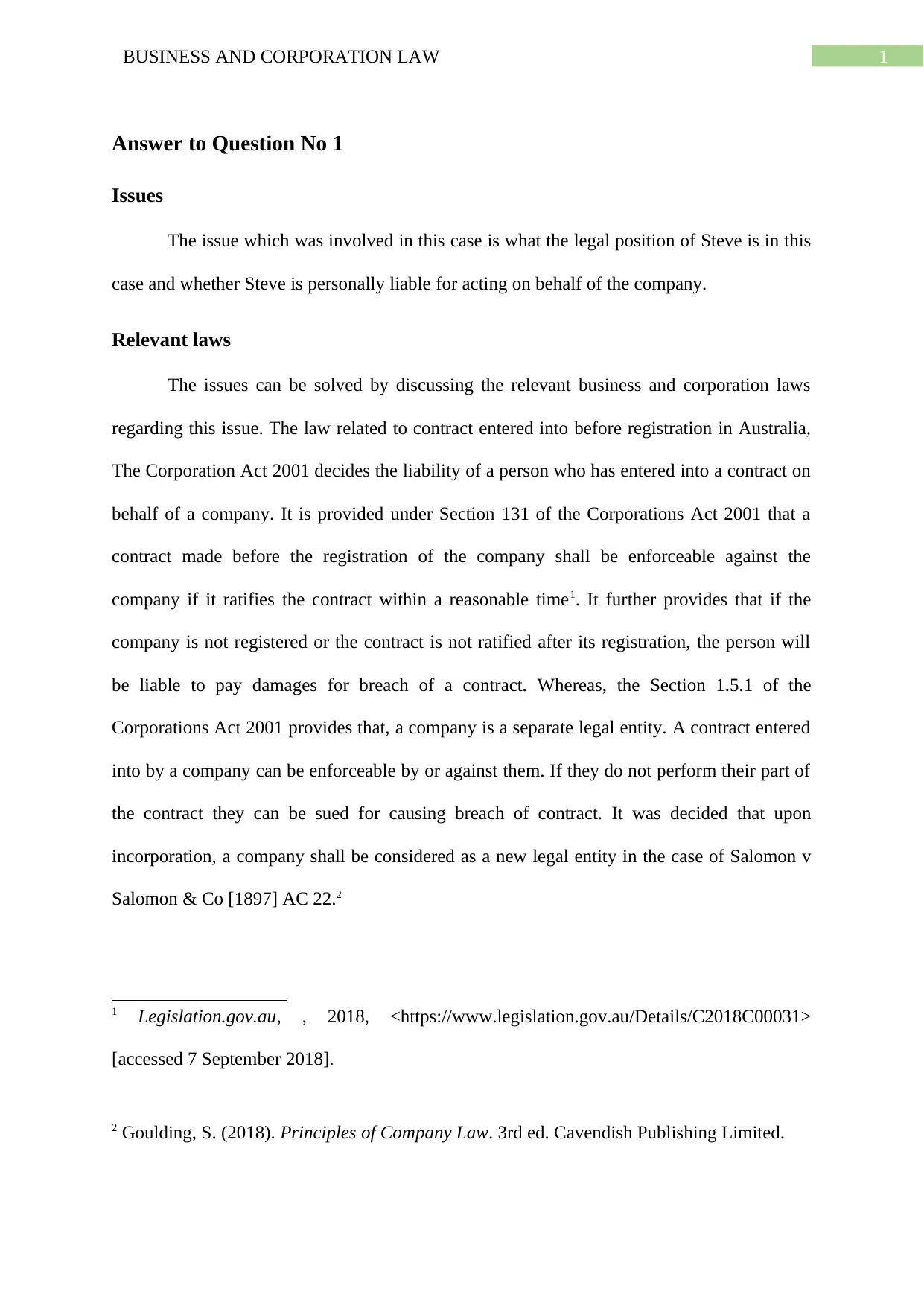
1BUSINESS AND CORPORATION LAW
Answer to Question No 1
Issues
The issue which was involved in this case is what the legal position of Steve is in this
case and whether Steve is personally liable for acting on behalf of the company.
Relevant laws
The issues can be solved by discussing the relevant business and corporation laws
regarding this issue. The law related to contract entered into before registration in Australia,
The Corporation Act 2001 decides the liability of a person who has entered into a contract on
behalf of a company. It is provided under Section 131 of the Corporations Act 2001 that a
contract made before the registration of the company shall be enforceable against the
company if it ratifies the contract within a reasonable time1. It further provides that if the
company is not registered or the contract is not ratified after its registration, the person will
be liable to pay damages for breach of a contract. Whereas, the Section 1.5.1 of the
Corporations Act 2001 provides that, a company is a separate legal entity. A contract entered
into by a company can be enforceable by or against them. If they do not perform their part of
the contract they can be sued for causing breach of contract. It was decided that upon
incorporation, a company shall be considered as a new legal entity in the case of Salomon v
Salomon & Co [1897] AC 22.2
1 Legislation.gov.au, , 2018, <https://www.legislation.gov.au/Details/C2018C00031>
[accessed 7 September 2018].
2 Goulding, S. (2018). Principles of Company Law. 3rd ed. Cavendish Publishing Limited.
Answer to Question No 1
Issues
The issue which was involved in this case is what the legal position of Steve is in this
case and whether Steve is personally liable for acting on behalf of the company.
Relevant laws
The issues can be solved by discussing the relevant business and corporation laws
regarding this issue. The law related to contract entered into before registration in Australia,
The Corporation Act 2001 decides the liability of a person who has entered into a contract on
behalf of a company. It is provided under Section 131 of the Corporations Act 2001 that a
contract made before the registration of the company shall be enforceable against the
company if it ratifies the contract within a reasonable time1. It further provides that if the
company is not registered or the contract is not ratified after its registration, the person will
be liable to pay damages for breach of a contract. Whereas, the Section 1.5.1 of the
Corporations Act 2001 provides that, a company is a separate legal entity. A contract entered
into by a company can be enforceable by or against them. If they do not perform their part of
the contract they can be sued for causing breach of contract. It was decided that upon
incorporation, a company shall be considered as a new legal entity in the case of Salomon v
Salomon & Co [1897] AC 22.2
1 Legislation.gov.au, , 2018, <https://www.legislation.gov.au/Details/C2018C00031>
[accessed 7 September 2018].
2 Goulding, S. (2018). Principles of Company Law. 3rd ed. Cavendish Publishing Limited.
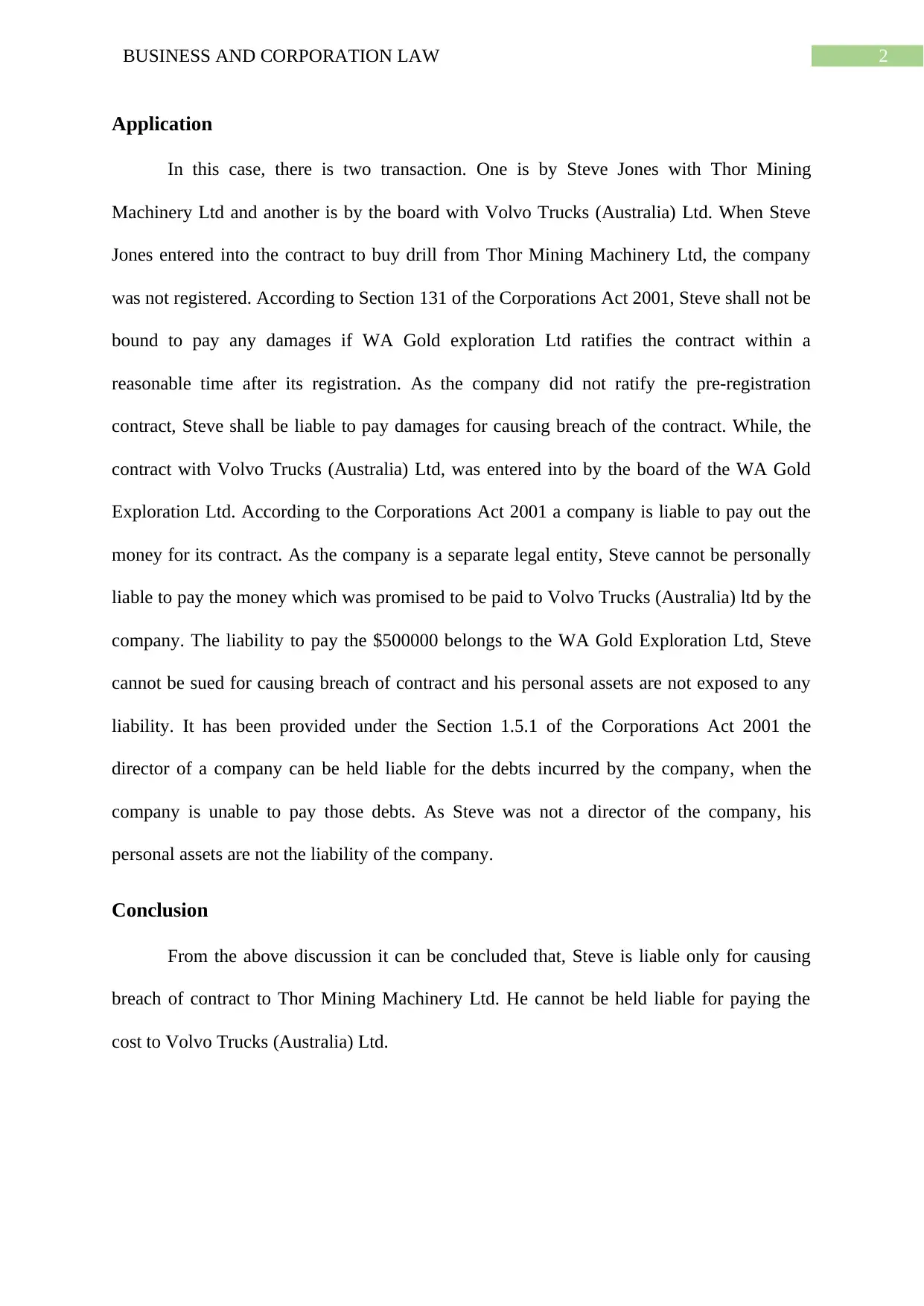
2BUSINESS AND CORPORATION LAW
Application
In this case, there is two transaction. One is by Steve Jones with Thor Mining
Machinery Ltd and another is by the board with Volvo Trucks (Australia) Ltd. When Steve
Jones entered into the contract to buy drill from Thor Mining Machinery Ltd, the company
was not registered. According to Section 131 of the Corporations Act 2001, Steve shall not be
bound to pay any damages if WA Gold exploration Ltd ratifies the contract within a
reasonable time after its registration. As the company did not ratify the pre-registration
contract, Steve shall be liable to pay damages for causing breach of the contract. While, the
contract with Volvo Trucks (Australia) Ltd, was entered into by the board of the WA Gold
Exploration Ltd. According to the Corporations Act 2001 a company is liable to pay out the
money for its contract. As the company is a separate legal entity, Steve cannot be personally
liable to pay the money which was promised to be paid to Volvo Trucks (Australia) ltd by the
company. The liability to pay the $500000 belongs to the WA Gold Exploration Ltd, Steve
cannot be sued for causing breach of contract and his personal assets are not exposed to any
liability. It has been provided under the Section 1.5.1 of the Corporations Act 2001 the
director of a company can be held liable for the debts incurred by the company, when the
company is unable to pay those debts. As Steve was not a director of the company, his
personal assets are not the liability of the company.
Conclusion
From the above discussion it can be concluded that, Steve is liable only for causing
breach of contract to Thor Mining Machinery Ltd. He cannot be held liable for paying the
cost to Volvo Trucks (Australia) Ltd.
Application
In this case, there is two transaction. One is by Steve Jones with Thor Mining
Machinery Ltd and another is by the board with Volvo Trucks (Australia) Ltd. When Steve
Jones entered into the contract to buy drill from Thor Mining Machinery Ltd, the company
was not registered. According to Section 131 of the Corporations Act 2001, Steve shall not be
bound to pay any damages if WA Gold exploration Ltd ratifies the contract within a
reasonable time after its registration. As the company did not ratify the pre-registration
contract, Steve shall be liable to pay damages for causing breach of the contract. While, the
contract with Volvo Trucks (Australia) Ltd, was entered into by the board of the WA Gold
Exploration Ltd. According to the Corporations Act 2001 a company is liable to pay out the
money for its contract. As the company is a separate legal entity, Steve cannot be personally
liable to pay the money which was promised to be paid to Volvo Trucks (Australia) ltd by the
company. The liability to pay the $500000 belongs to the WA Gold Exploration Ltd, Steve
cannot be sued for causing breach of contract and his personal assets are not exposed to any
liability. It has been provided under the Section 1.5.1 of the Corporations Act 2001 the
director of a company can be held liable for the debts incurred by the company, when the
company is unable to pay those debts. As Steve was not a director of the company, his
personal assets are not the liability of the company.
Conclusion
From the above discussion it can be concluded that, Steve is liable only for causing
breach of contract to Thor Mining Machinery Ltd. He cannot be held liable for paying the
cost to Volvo Trucks (Australia) Ltd.
⊘ This is a preview!⊘
Do you want full access?
Subscribe today to unlock all pages.

Trusted by 1+ million students worldwide
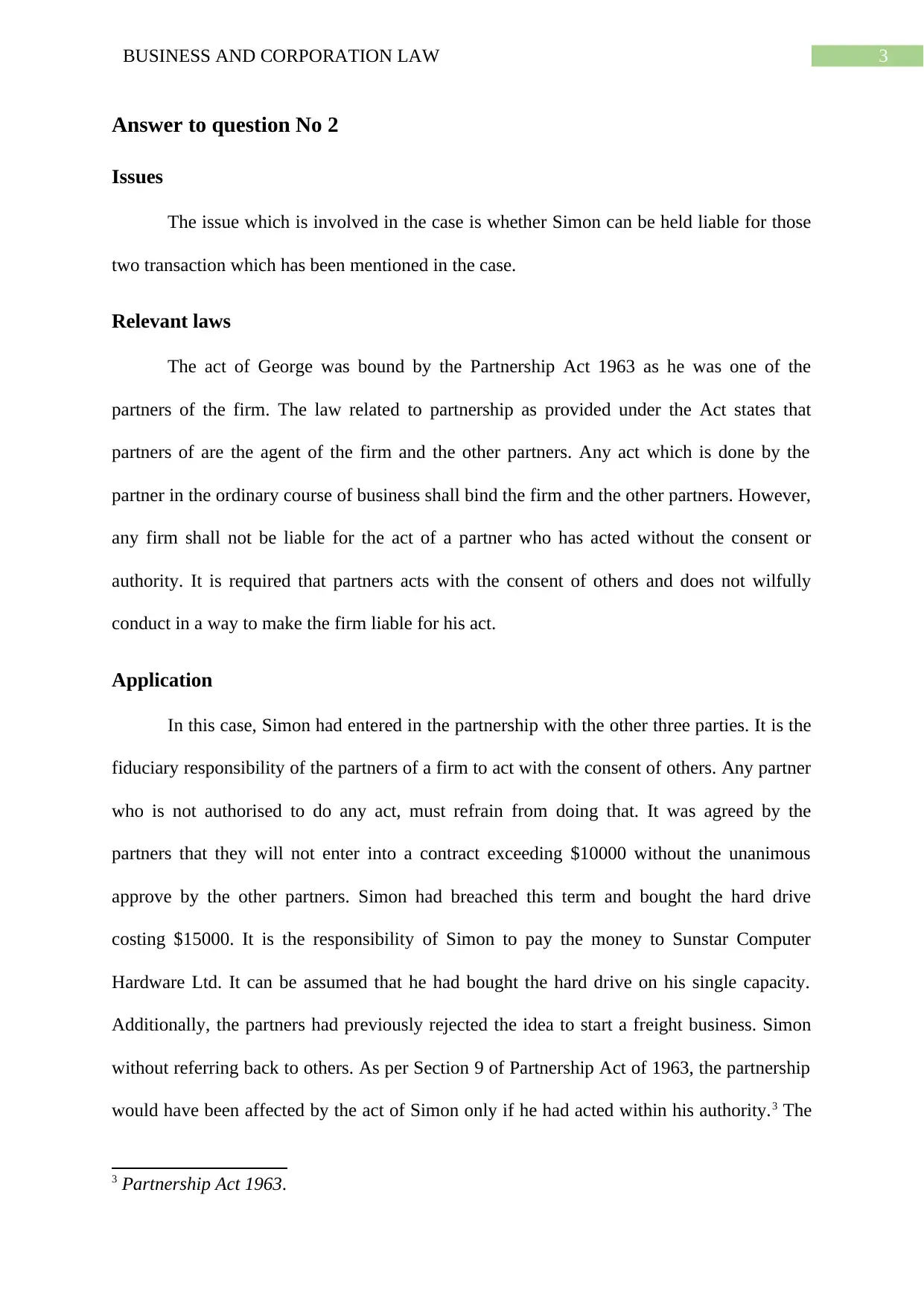
3BUSINESS AND CORPORATION LAW
Answer to question No 2
Issues
The issue which is involved in the case is whether Simon can be held liable for those
two transaction which has been mentioned in the case.
Relevant laws
The act of George was bound by the Partnership Act 1963 as he was one of the
partners of the firm. The law related to partnership as provided under the Act states that
partners of are the agent of the firm and the other partners. Any act which is done by the
partner in the ordinary course of business shall bind the firm and the other partners. However,
any firm shall not be liable for the act of a partner who has acted without the consent or
authority. It is required that partners acts with the consent of others and does not wilfully
conduct in a way to make the firm liable for his act.
Application
In this case, Simon had entered in the partnership with the other three parties. It is the
fiduciary responsibility of the partners of a firm to act with the consent of others. Any partner
who is not authorised to do any act, must refrain from doing that. It was agreed by the
partners that they will not enter into a contract exceeding $10000 without the unanimous
approve by the other partners. Simon had breached this term and bought the hard drive
costing $15000. It is the responsibility of Simon to pay the money to Sunstar Computer
Hardware Ltd. It can be assumed that he had bought the hard drive on his single capacity.
Additionally, the partners had previously rejected the idea to start a freight business. Simon
without referring back to others. As per Section 9 of Partnership Act of 1963, the partnership
would have been affected by the act of Simon only if he had acted within his authority.3 The
3 Partnership Act 1963.
Answer to question No 2
Issues
The issue which is involved in the case is whether Simon can be held liable for those
two transaction which has been mentioned in the case.
Relevant laws
The act of George was bound by the Partnership Act 1963 as he was one of the
partners of the firm. The law related to partnership as provided under the Act states that
partners of are the agent of the firm and the other partners. Any act which is done by the
partner in the ordinary course of business shall bind the firm and the other partners. However,
any firm shall not be liable for the act of a partner who has acted without the consent or
authority. It is required that partners acts with the consent of others and does not wilfully
conduct in a way to make the firm liable for his act.
Application
In this case, Simon had entered in the partnership with the other three parties. It is the
fiduciary responsibility of the partners of a firm to act with the consent of others. Any partner
who is not authorised to do any act, must refrain from doing that. It was agreed by the
partners that they will not enter into a contract exceeding $10000 without the unanimous
approve by the other partners. Simon had breached this term and bought the hard drive
costing $15000. It is the responsibility of Simon to pay the money to Sunstar Computer
Hardware Ltd. It can be assumed that he had bought the hard drive on his single capacity.
Additionally, the partners had previously rejected the idea to start a freight business. Simon
without referring back to others. As per Section 9 of Partnership Act of 1963, the partnership
would have been affected by the act of Simon only if he had acted within his authority.3 The
3 Partnership Act 1963.
Paraphrase This Document
Need a fresh take? Get an instant paraphrase of this document with our AI Paraphraser
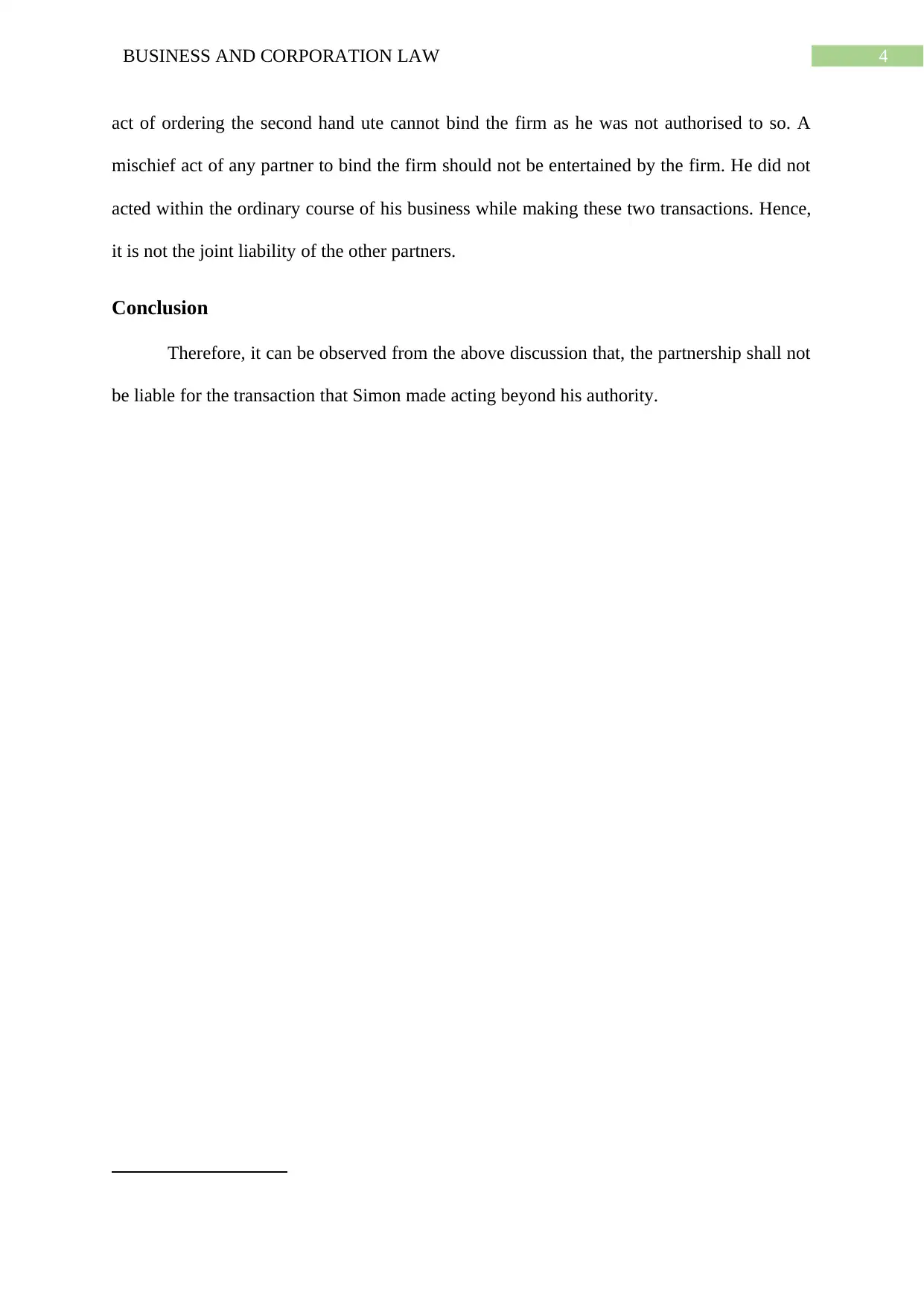
4BUSINESS AND CORPORATION LAW
act of ordering the second hand ute cannot bind the firm as he was not authorised to so. A
mischief act of any partner to bind the firm should not be entertained by the firm. He did not
acted within the ordinary course of his business while making these two transactions. Hence,
it is not the joint liability of the other partners.
Conclusion
Therefore, it can be observed from the above discussion that, the partnership shall not
be liable for the transaction that Simon made acting beyond his authority.
act of ordering the second hand ute cannot bind the firm as he was not authorised to so. A
mischief act of any partner to bind the firm should not be entertained by the firm. He did not
acted within the ordinary course of his business while making these two transactions. Hence,
it is not the joint liability of the other partners.
Conclusion
Therefore, it can be observed from the above discussion that, the partnership shall not
be liable for the transaction that Simon made acting beyond his authority.
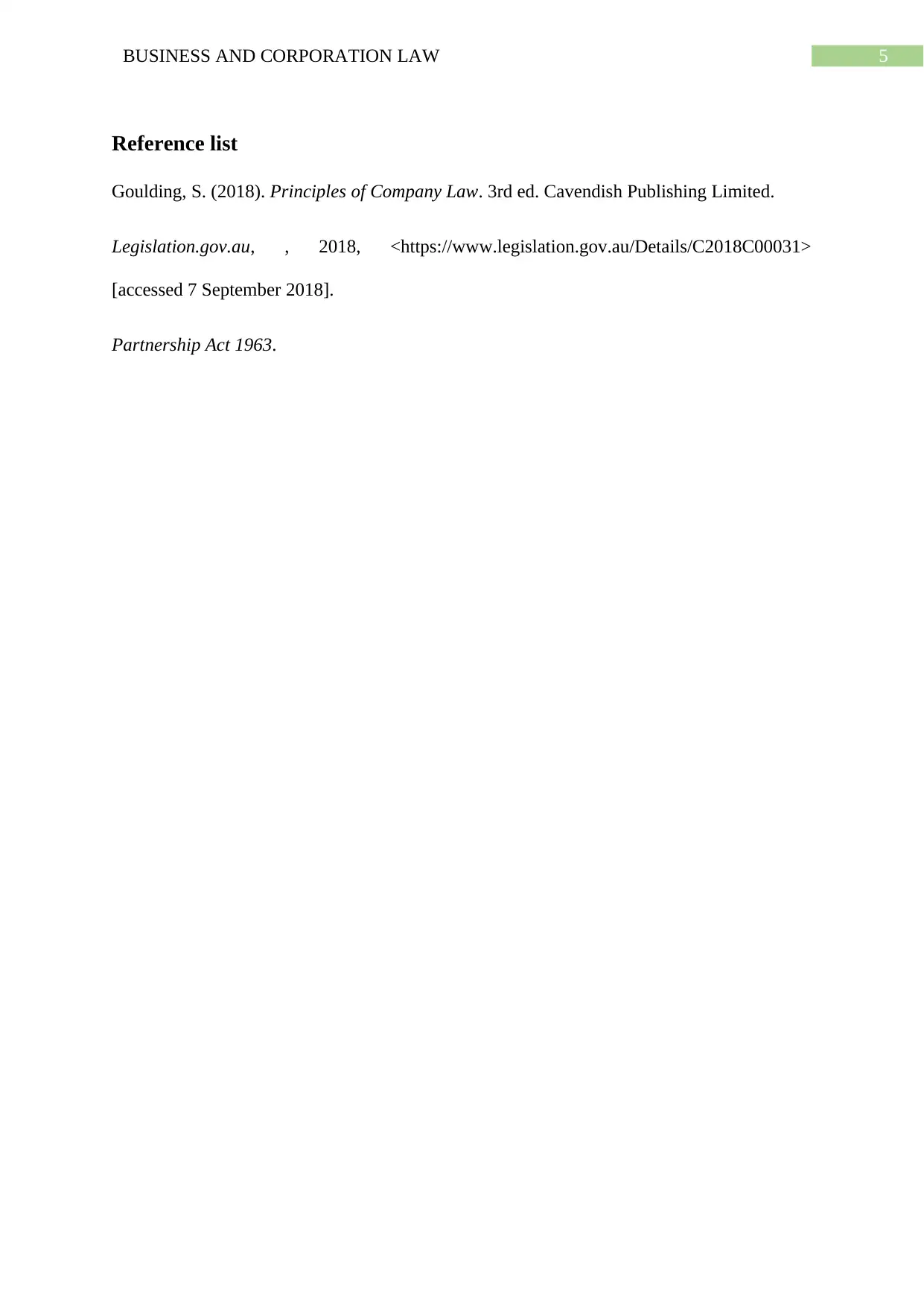
5BUSINESS AND CORPORATION LAW
Reference list
Goulding, S. (2018). Principles of Company Law. 3rd ed. Cavendish Publishing Limited.
Legislation.gov.au, , 2018, <https://www.legislation.gov.au/Details/C2018C00031>
[accessed 7 September 2018].
Partnership Act 1963.
Reference list
Goulding, S. (2018). Principles of Company Law. 3rd ed. Cavendish Publishing Limited.
Legislation.gov.au, , 2018, <https://www.legislation.gov.au/Details/C2018C00031>
[accessed 7 September 2018].
Partnership Act 1963.
⊘ This is a preview!⊘
Do you want full access?
Subscribe today to unlock all pages.

Trusted by 1+ million students worldwide
1 out of 6
Related Documents
Your All-in-One AI-Powered Toolkit for Academic Success.
+13062052269
info@desklib.com
Available 24*7 on WhatsApp / Email
![[object Object]](/_next/static/media/star-bottom.7253800d.svg)
Unlock your academic potential
Copyright © 2020–2026 A2Z Services. All Rights Reserved. Developed and managed by ZUCOL.


